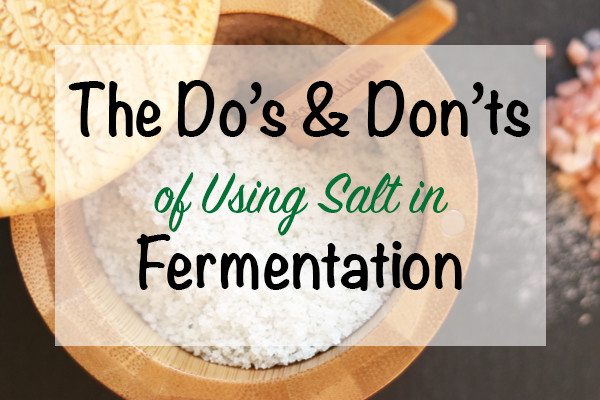The type of salt you use for fermentation is very important. Salt is necessary to preserve the ferment and can add rich minerals, nutrients and flavor if you choose the right one.
With so many different choices of salt available to us, (fine, course, blocks, red, black, grey, pink), determining which salt to use can get confusing and a little overwhelming.
Which types of salt should you use for fermentation?
Here is a list of the do’s and don’ts of using salt in fermentation.
Don’t use…
Refined Table Salt is the most common type of salt used in the American diet. It’s 97% sodium chloride and all the trace minerals have been removed from it. Anti-caking agents are added to table salt to keep it from clumping and most contain iodine. Don’t use table salt in your ferments. The chemicals and use of iodine can inhibit the fermentation process and lead to salty tasting fermented vegetables or sauerkraut.
Kosher Salt is a course salt and similar to table salt in that it’s refined and some contain anti-caking agents. If you use kosher salt, it will make your fermented vegetables taste too salty. I don’t recommend using kosher salt.
Pickling Salt is a refined salt with no additives. Although it’s free of additives I still avoid it, because its refined.
Do use…
Sea Salt is made from evaporated salt water and therefore has more trace minerals and less sodium than table salt. Even some sea salts can be refined and stripped of their mineral content. I recommend using a mineral rich unrefined sea salt, such as Celtic Sea Salt in your ferments. Salts like this contain many trace minerals.
Mineral rich salt mined from ancient sea beds like pink himalayan salt from Pakistan contain many beneficial trace minerals. I highly recommend these types of salts, because they are rich in minerals and taste great.
The salt you use can change the flavor of your fermented vegetables and sauerkraut. Salts depleted of their minerals and that are high in sodium chloride like table salt, have a harsher salty flavor, while mineral rich sea salts have a more mild salty flavor and can taste slightly sweet.
I challenge you to do a side-by-side salt tasting to see if you can tell the difference between the different types of salts. You’ll be surprised of the difference. And I challenge you to use unrefined mineral rich salt in your next fermentation to boost flavor and nutrients.
Happy Fermenting!
Danielle
Some links on this page are affiliate links and they are all for companies that I support and buy from myself. If you decide to purchase any of these products through these links, I will earn a small commission and you will have my sincere thanks for supporting Fermented Food Lab.
[optinlock id=”3″][/optinlock]

I am new to fermenting foods and really enjoying the recipes I’ve tried. My only concern is the sodium. Can it be harmful?
If you use mineral rich salts, such as celtic sea salt or himalayan sea salt it can be beneficial to you, because they contain minerals that most diets are lacking.
What do you mean by refined? I was given about 10kg of very course pink himalayan salt. If I put tjis in the thermomix and blend is it then refined?
What I mean by refined, is salt that is processed with chemicals. Himalayan salt is not refined. I highly recommend it. You can blend the course salt to make it a finer grain. That’s not considered refined.
The trace elements in salt don’t have any effect on human health because the quantities are so low. That’s why the pink salt from Pakistan doesn’t hurt you even though it contains a tiny bit of lead and uranium.
What would you suggest I use Black Salt with as it is a little sulphurous which is why I haven’t used it yet. I normally ferment with the Himalayan Rock Salt?
I haven’t tried fermenting with black salt, so I don’t know how it will affect flavor and fermenting. The himalayan salt will work great though.
Hi Danielle, I respectfully disagree with the no Kosher salt part. I’ve used it for years and with great results. Kosher also has very uniform size grains. Sea salt will be next to try. Also I ALWAYS use distilled as well. That way there is no variable in water. Distilled is what it is…. Next gig is fermented hot sauce with Thai, Habenaro and cayenne peppers from my garden.
Here is a good link for additives in salt Danielle. https://www.toxinless.com/salt
I would take a look at the link for Celtic Sea Salt….
Hi!
Do you know if you can use low sodium salt?
Thanks
Jim
I just started a batch of sauerkraut yesterday and I used Kosher salt, should I rinse it out and use fine pink salt ?